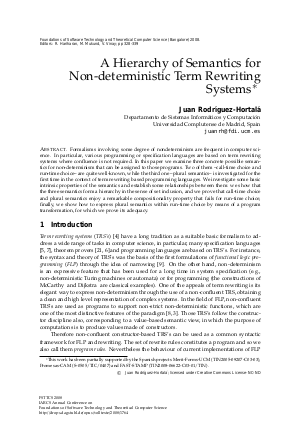A Hierarchy of Semantics for Non-deterministic Term Rewriting Systems
Author Juan Rodriguez-Hortala
-
Part of:
Volume:
IARCS Annual Conference on Foundations of Software Technology and Theoretical Computer Science (FSTTCS 2008)
Part of: Series: Leibniz International Proceedings in Informatics (LIPIcs)
Part of: Conference: IARCS Annual Conference on Foundations of Software Technology and Theoretical Computer Science (FSTTCS) - License:
 Creative Commons Attribution-NonCommercial-NoDerivs 3.0 Unported license
Creative Commons Attribution-NonCommercial-NoDerivs 3.0 Unported license
- Publication Date: 2008-12-05
File

PDF
LIPIcs.FSTTCS.2008.1764.pdf
- Filesize: 433 kB
- 12 pages
Document Identifiers
Subject Classification
Keywords
- Functional-logic programming
- term rewriting systems
- constructor-based rewriting logic
- non-determinism
- call-time choice semantics
- run-time choice
Metrics
- Access Statistics
-
Total Accesses (updated on a weekly basis)
0Document
0Metadata
Abstract
Formalisms involving some degree of nondeterminism are frequent in computer science. In particular, various programming or specification languages are based on term rewriting systems where confluence is not required. In this paper we examine three concrete possible semantics for non-determinism that can be assigned to those programs. Two of them --call-time choice and run-time choice-- are quite well-known, while the third one --plural semantics-- is investigated for the first time in the context of term rewriting based programming languages. We investigate some basic intrinsic properties of the semantics and establish some relationships between them: we show that the three semantics form a hierarchy in the sense of set inclusion, and we prove that call-time choice and plural semantics enjoy a remarkable compositionality property that fails for run-time choice; finally, we show how to express plural semantics within run-time choice by means of a program transformation, for which we prove its adequacy.
Cite As Get BibTex
Juan Rodriguez-Hortala. A Hierarchy of Semantics for Non-deterministic Term Rewriting Systems. In IARCS Annual Conference on Foundations of Software Technology and Theoretical Computer Science. Leibniz International Proceedings in Informatics (LIPIcs), Volume 2, pp. 328-339, Schloss Dagstuhl – Leibniz-Zentrum für Informatik (2008)
https://doi.org/10.4230/LIPIcs.FSTTCS.2008.1764
BibTex
@InProceedings{rodriguezhortala:LIPIcs.FSTTCS.2008.1764,
author = {Rodriguez-Hortala, Juan},
title = {{A Hierarchy of Semantics for Non-deterministic Term Rewriting Systems}},
booktitle = {IARCS Annual Conference on Foundations of Software Technology and Theoretical Computer Science},
pages = {328--339},
series = {Leibniz International Proceedings in Informatics (LIPIcs)},
ISBN = {978-3-939897-08-8},
ISSN = {1868-8969},
year = {2008},
volume = {2},
editor = {Hariharan, Ramesh and Mukund, Madhavan and Vinay, V},
publisher = {Schloss Dagstuhl -- Leibniz-Zentrum f{\"u}r Informatik},
address = {Dagstuhl, Germany},
URL = {https://drops.dagstuhl.de/entities/document/10.4230/LIPIcs.FSTTCS.2008.1764},
URN = {urn:nbn:de:0030-drops-17643},
doi = {10.4230/LIPIcs.FSTTCS.2008.1764},
annote = {Keywords: Functional-logic programming, term rewriting systems, constructor-based rewriting logic, non-determinism, call-time choice semantics, run-time choice}
}
